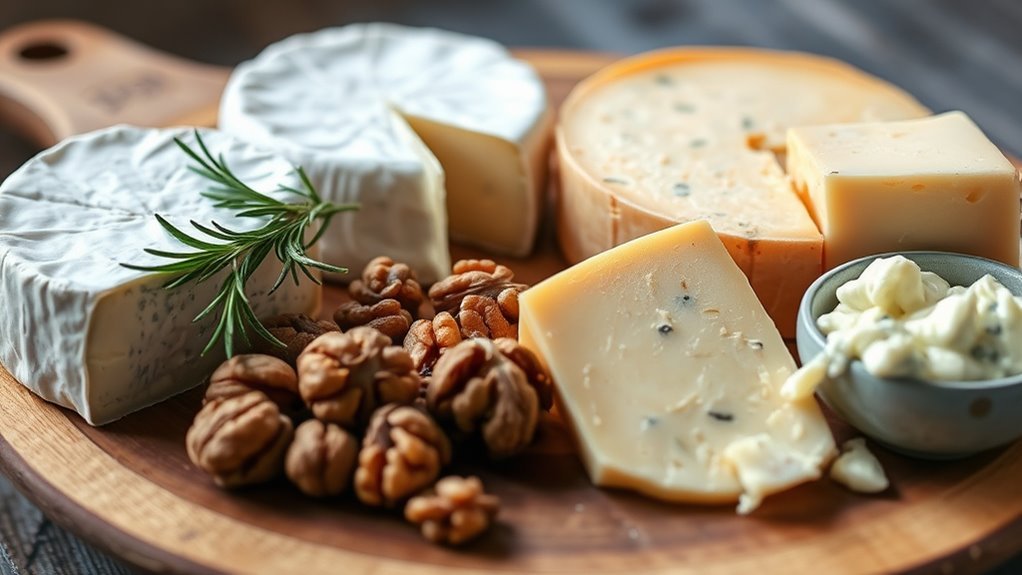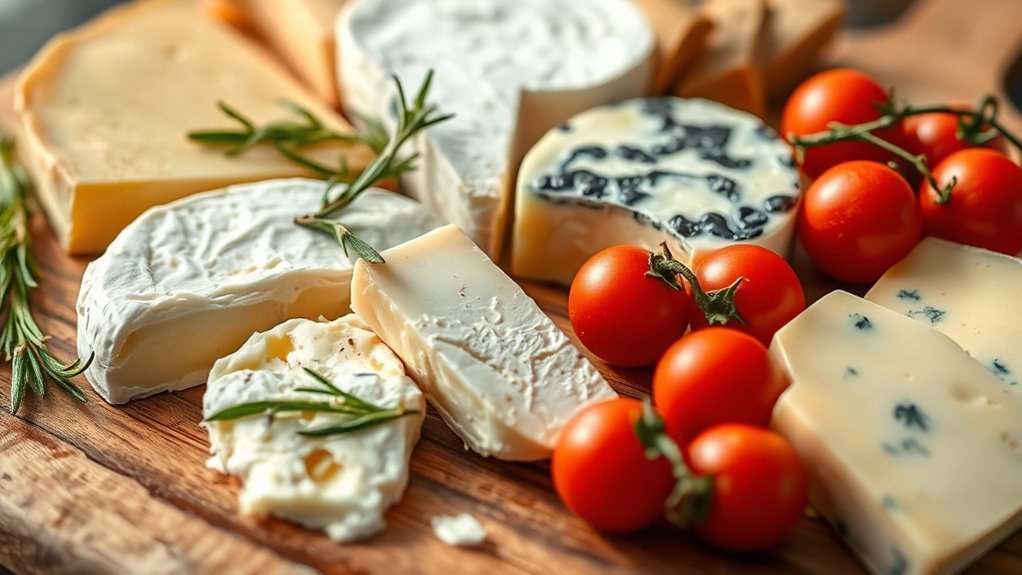Yes, cheese is keto-friendly! It’s high in fat and low in carbohydrates, making it a great addition to your low-carb diet. Varieties like cheddar, mozzarella, and cream cheese are excellent choices, with significant fat content and minimal carbs. Cheese provides essential nutrients like calcium and protein, promoting satiety. However, moderation is important, as some people may be sensitive to dairy. Discover how you can incorporate different types of cheese into your meals for added flavor and nutrition.
Understanding the Keto Diet and Its Principles

When you consider adopting a ketogenic (keto) diet, it’s essential to understand its core principles. At its heart, keto basics focus on drastically reducing carbohydrate intake while increasing dietary fats. This shift encourages your body to enter a state of ketosis, where it burns fat for fuel instead of glucose. You’ll typically aim for a macronutrient ratio of about 70-75% fats, 20-25% protein, and only 5-10% carbohydrates. Emphasizing healthy fats, like avocados, nuts, and olive oil, is crucial for overall well-being. While freedom in food choices is appealing, balancing these dietary fats is key to sustaining energy levels and peak health. Remember, it’s not just about what you eat, but how it aligns with your lifestyle and goals.
Nutritional Breakdown of Popular Cheeses

Cheese can be a delicious and versatile addition to a keto diet, but understanding its nutritional profile is important for making informed choices. Different cheese varieties can vary markedly in fat content, which is essential for maintaining ketosis.
Here’s a quick breakdown of some popular cheeses:
| Cheese | Fat Content (grams) | Carbohydrates (grams) |
|---|---|---|
| Cheddar | 33 | 1 |
| Mozzarella | 22 | 2 |
| Cream Cheese | 34 | 3 |
Low-Carb Cheese Options for Your Keto Diet

What low-carb cheese options can you incorporate into your keto diet? There are plenty of delicious cheese varieties that fit perfectly. For instance, mozzarella, cheddar, and cream cheese are all excellent low-carb choices. Goat cheese and feta also pack a flavorful punch while keeping your carb count low.
These cheeses make for great keto snacks, whether you enjoy them on their own or pair them with some olives or low-carb crackers. Additionally, consider trying aged cheeses like Parmesan, which are often lower in lactose and carbohydrates. Remember, moderation is key, but with these options, you can indulge in your love for cheese while staying on track with your keto lifestyle. Enjoy the freedom of flavor without the carbs!
How to Incorporate Cheese Into Your Meals
Incorporating cheese into your meals can enhance both flavor and texture, making your keto diet more enjoyable. With a variety of cheese varieties available, you can easily find delicious meal pairings that suit your taste. Here are some ideas to get you started:
| Cheese Varieties | Meal Pairings | Tips |
|---|---|---|
| Cheddar | Omelets, burgers | Shred for even melting |
| Mozzarella | Salads, pizzas | Fresh for salads, baked |
| Goat Cheese | Vegetables, spreads | Crumble for added flavor |
Experimenting with different cheese varieties can transform your dishes while keeping your carb count low. Don’t hesitate to combine cheeses for a richer taste and texture in your favorite meals!
Potential Health Benefits and Considerations of Cheese on Keto
Adding cheese to your meals not only enhances flavor but also offers several potential health benefits on a keto diet. When considering cheese consumption, you might find that it aligns well with your nutritional goals.
- Rich in Nutrients: Cheese is packed with calcium, protein, and essential vitamins.
- Supports Satiety: The healthy fats in cheese can keep you feeling full longer, aiding in weight management.
- Low in Carbs: Most cheeses have minimal carbohydrates, making them a perfect fit for keto.
While cheese benefits your diet, it’s vital to consume it in moderation. Some individuals may be sensitive to dairy, so listen to your body. Overall, incorporating cheese wisely can enhance your keto experience while delivering essential nutrients.
Frequently Asked Questions about Cheese and Keto
1. Is cheese allowed on a keto diet?
Yes, cheese is generally allowed on a keto diet. It is low in carbohydrates and high in fats, making it a suitable food choice for those following a ketogenic lifestyle. However, it’s important to choose full-fat cheeses and consume them in moderation to maintain ketosis.
2. What types of cheese are best for a keto diet?
Some of the best cheeses for a keto diet include cheddar, mozzarella, cream cheese, goat cheese, and blue cheese. These cheeses are lower in carbohydrates and higher in fat, which aligns with the nutritional goals of a ketogenic diet. Always check labels for carbohydrate content to ensure they fit within your daily limits.
3. Can cheese stall weight loss on keto?
While cheese can be part of a healthy keto diet, consuming it in excess may stall weight loss for some individuals. Cheese is calorie-dense, and overeating it could lead to a caloric surplus. It’s crucial to balance your cheese intake with other foods and monitor overall calorie consumption to stay on track with your weight loss goals.
4. Are there any cheese alternatives for keto?
Yes, there are several cheese alternatives suitable for a keto diet, particularly for those who are lactose intolerant or avoiding dairy. Options include nut-based cheeses made from almonds or cashews, as well as plant-based cheeses that use coconut oil or soy. Always check the nutritional content to ensure they are low in carbs and fit your dietary needs.
5. Does cheese impact ketosis?
Cheese can impact ketosis, but it largely depends on the amount consumed and the type of cheese. Most cheeses are low in carbohydrates, so moderate consumption typically does not hinder ketosis. However, excessive intake of high-carb cheeses or processed cheese products may disrupt ketosis. Monitoring your overall carbohydrate intake is essential to remain in a state of ketosis.
References
- https://www.healthline.com/nutrition/cheese-and-keto-diet
- https://www.ncbi.nlm.nih.gov/pmc/articles/PMC6520934/
- https://www.medicalnewstoday.com/articles/cheese-and-the-keto-diet
- https://www.diabetes.org/nutrition/healthy-food-choices-made-easy/cheese
- https://www.wisewell.com/blogs/blog/is-cheese-keto-friendly
- https://www.ncbi.nlm.nih.gov/pmc/articles/PMC6313445/
- https://www.bbcgoodfood.com/howto/guide/keto-diet-what-eat-and-avoid
- https://www.health.gov.au/resources/publications/the-ketogenic-diet
- https://www.eatright.org/health/wellness/preventing-illness/the-ketogenic-diet


